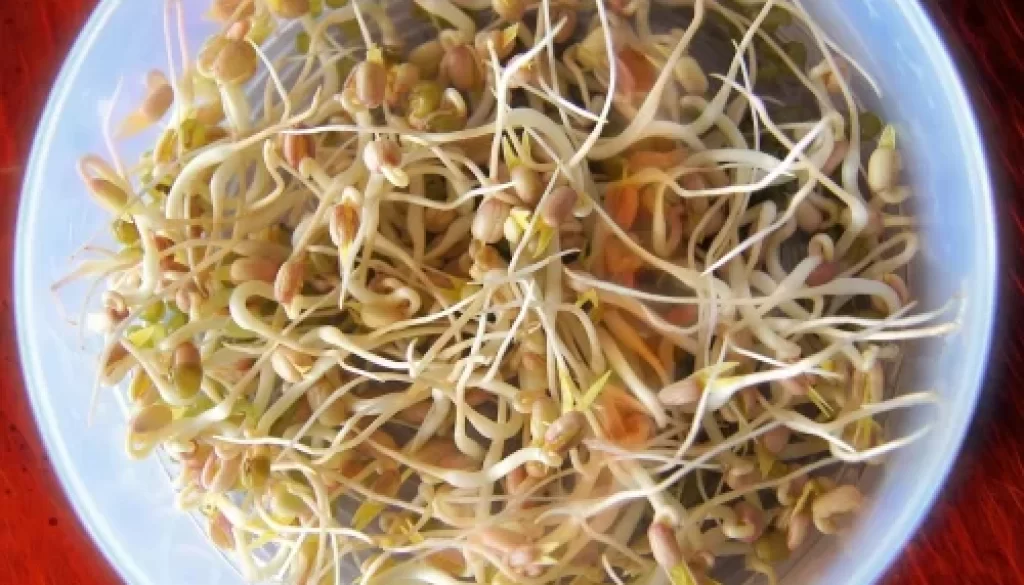5 Amazing Health Benefits You Get When You Eat Sprouts
By %author%
Image Credit: BarbaraJackson
Eating sprouts has become so popular due to their numerous health benefits. Mung beans (popularly known as bean sprouts) and alfalfa sprouts are known for their high-fiber content, which helps reduce bloating and promote gut health.
But that’s not all, research has shown that young sprouts often contain higher levels of certain nutrients than mature plants. Emily Ho, a professor, and director of the Linus Pauling Institute at Oregon State University, highlighted the unique advantages of consuming sprouts over mature plants in her research on broccoli sprouts. She explained, “Five–to seven-day-old seed sprouts can often offer more nutrition benefits than the mature plants.”
Table of Contents
Health Benefits of Eating Sprouts
Sprouts are easy to grow at home and incredibly versatile. You can consume them raw in salads, sandwiches, and smoothies or cooked (in stir-fries and soups). According to health experts, these are sprouts’ top 5 health benefits.
1. When You Eat Sprout You Get A Ton of Nutrition
Sprouts are often referred to as nutritional powerhouses—and for good reason. It turns out that they pack surprising amounts of nutrients into their small size. The sprouting process significantly increases the bioavailability of vitamins, minerals, antioxidants, and enzymes. This makes sprouted seeds even more beneficial than the original seed.
Recent research showed that sprouting increases the protein in seeds and enhances the availability of essential amino acids. Some types of sprouts see an increase of as much as 30%.
Furthermore, the sprouting process enhances protein digestibility by up to 87%. This is likely due to reduced antinutrients–compounds that hinder nutrient absorption.
And interestingly, these benefits aren’t limited to raw sprouts. They extend to foods made from sprouted beans. Tofu and soy milk from sprouted soybeans boast 7–13% more protein, 12–24% less fat, and 56–81% fewer antinutrients than unsprouted seeds.
2. You Get Improved Digestion and Gut Health
Sprouts are excellent for supporting digestion and maintaining gut health. They have increased fiber content, particularly insoluble fiber, which helps form stool. This allows food to move smoothly through the digestive tract.
Sprouting makes food easier to digest by reducing antinutrients like phytic acid. As mentioned, antinutrients can block your body from absorbing minerals. Sprouting lowers their levels significantly. This means you get more nutrients from your food and experience less digestive discomfort.
Additionally, sprouts contain natural enzymes that help break down food more efficiently. This can reduce common issues like bloating and indigestion.
Beyond digestion, sprouts may benefit the gut microbiome. Fiber-rich foods encourage the growth of beneficial gut bacteria, which play a key role in overall health. Therefore, adding sprouts like broccoli or bean sprouts into your meals is a simple way to boost these benefits.
3. When You Eat Sprouts, You Get Enhanced Immune
Yes, sprouts are rich in immune-supporting nutrients that help defend your body against infections and illnesses. Vitamin C, for instance, is a crucial antioxidant that supports white blood cell production, helping your body fight off infections.
Sprouts also provide zinc, a mineral essential for the development and activation of T-cells, another key component of your immune defense. They contain plant compounds like glucosinolates and flavonoids, which have been linked to enhanced immunity. Brussels sprouts, in particular, are rich in sulforaphane, a compound with anti-inflammatory and antimicrobial properties.
4. Lower Risk of Chronic Diseases
Inflammation, free radicals, and cholesterol are the major contributors to various chronic diseases, including arthritis, diabetes, and heart disease. Sprouts can significantly reduce the risk of these diseases by addressing specific risk factors and underlying causes.
Here’s a breakdown of how eating sprouts can benefit different conditions:
Heart Disease
High cholesterol, hypertension, and oxidative stress are often listed as the major causes of heart disease. Sprouts are known for their low cholesterol and high levels of nutrients, so, including them in your daily diet can do wonders. A recent study on this issue revealed how lentil sprouts lowered LDL (“bad”) cholesterol and boosted HDL (“good”) cholesterol. And for a healthy heart, this balance is very important.
That’s not all. The Potassium in sprouts helps regulate blood pressure by relaxing blood vessels. This reduces the strain on the heart and leads to better blood pressure regulation.
The antioxidants, like flavonoids found in mung bean sprouts, further protect against oxidative stress, which is linked to cardiovascular problems. These improvements collectively reduce your risk of heart-related complications.
Blood Pressure
Lentil sprouts and mung beans have a low glycemic index and high fiber content, which help stabilize blood sugar levels. This reduces the risk of type 2 diabetes by preventing blood sugar spikes and improving insulin sensitivity.
Inflammation-Related Diseases
Chronic inflammation is a major contributor to diseases like arthritis, inflammatory bowel disease, and even cancer. Over time, unchecked inflammation can damage tissues, disrupt normal cellular functions, and increase the risk of serious health problems.
Sprouts, especially broccoli sprouts, are rich in sulforaphane, a bioactive compound with potent anti-inflammatory properties. Studies suggest that sulforaphane can help reduce inflammatory markers in the body. This makes it beneficial for managing conditions linked to chronic inflammation.
The high antioxidant content in sprouts, including vitamin C, flavonoids, and polyphenols neutralizes free radicals. Free radicles are unstable molecules that cause oxidative stress. This is bad because it exacerbates inflammation which accelerates the development of chronic illnesses like cancer and cardiovascular disease.
5. Detoxification and Cleansing
Your body naturally detoxifies. However, including sprouts in your daily diet can amplify these processes.
Sprouts contain glucoraphanin, which converts into sulforaphane, which is a powerful detoxifier. It supports the liver in neutralizing and eliminating toxins. The high fiber content in sprouts further helps flush out waste products from your digestive system. This helps prevent toxin build-up and promotes a healthier gut.
How to Add Sprouts to Your Daily Diet
You can add sprouts to your daily diet in several ways.
- Add sprouts to salads and sandwiches,
- Blend sprouts into smoothies and pancake batter, or
- Cook with sprouts in stir-fries and soups.
Risk Precautions When You Eat Sprouts
Consuming sprouts, just like any other food, has potential safety risks.
For starters, sprouts can harbor harmful bacteria like Salmonella, E. coli, and Listeria, especially if mishandled or not stored properly.
Here is how you can minimize these risks:
- Wash sprouts thoroughly under clean running water before consumption.
- Cook thoroughly to an internal temperature of 165°F (74°C) if consuming cooked sprouts.
- Refrigerate immediately at 40°F (4°C) or below.
- Use within a short time, preferably within a few days of purchase.
- Discard any sprouts that appear slimy, discolored, or have an off-odor.
Be extra cautious when buying sprouts. The best types of sprouts are usually organic or non-GMO. Genetically Modified ones can expose you to pesticides and other harmful chemicals. This can be worse for individuals with allergies or sensitivities, including pregnant women, young children, the elderly, and people with weakened immune systems.
Eating Sprouts Benefits FAQs
Can you eat sprouts raw?
Yes, you can eat sprouts raw. It’s the best way to get the most out of sprouts. That said, raw sprouts can harbor harmful bacteria like Salmonella and E. coli if not washed or stored properly. Therefore, always follow proper food safety guidelines. This includes thorough washing with running water and refrigeration, to minimize the risk of food poisoning.
Are raw brussel sprouts good for you?
Yes, eating raw brussel sprouts can be very good for you. In fact, it is the best way to eat brussel sprouts since they retain more of their vitamins and minerals when eaten raw.
That said, some people may not like the raw taste of brussels sprouts.
Is it ok to eat brussel sprouts every day?
Yes, eating brussel sprouts daily can be part of a healthy diet. They are packed with nutrients like vitamins, minerals, and fiber. However, it’s always a good idea to have a varied diet to ensure you get a wide range of nutrients.
Are potato sprouts safe to eat?
No, potato sprouts are not safe to eat. They contain solanine, a toxic compound that can cause nausea, vomiting, and even more serious health problems. If you see sprouts on your potatoes, it’s best to discard them.
What happens if we eat sprouts daily?
Nothing will happen if you eat sprouts daily. Nevertheless, while nutritious, sprouts alone cannot provide all the essential nutrients your body needs. So, to maintain a healthy balanced diet, I recommend you add other food to your weekly diet.
The Bottom Line: Sprout Your Way into Healthy Living
Adding sprouts to your diet is an easy way to enhance your health. They have essential nutrients like antioxidants, vitamins, and fiber that can improve your immune system. And there are many ways to enjoy them, from salads and sandwiches to stir-fries and snacks. If you’re looking for delicious and creative ways to include sprouts in your meals, we have many tasty recipes that are easy to follow. And if you’re not a seasoned cook, don’t worry. Our recipes have tips for the best homemade meals to accommodate beginners.

